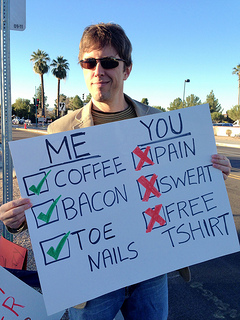Before my first attempt at the marathon I bragged to my friends and former coach about how I’d negative split the final miles in Central Park.
After the race, I got the biggest “I told ya so!” of my life from runners who knew better.
See, I hit the wall – hard. My pace through 20 miles was 6:06 but soon I was painfully shuffling along, even considering a stop around mile 23 when each step felt like a hammer crushing my quadriceps.
Soon I clipped off a 6:34 mile. Then a 6:44. My slowest was 7:09. Ouch.
Hindsight is 20/20 and looking back, I missed a crucial piece of the puzzle: I didn’t take marathon nutrition seriously.
Before racing 26.2 miles it was never a priority to worry about calories or carbohydrates. A normal breakfast of toast and a banana was all I needed.
And I paid the price with a dramatic bonk that left me nearly crippled with IT band syndrome and a bruised ego. I doubted I’d race another marathon ever again (and considered retiring from competitive running altogether).
But after I finally got healthy and built up the courage to tackle my second marathon, I knew I needed to take nutrition and carbohydrate loading more seriously.
I made significant changes to how I prepared, particularly nutrition, and ran the 2011 Philadelphia Marathon in 2:39:32 – a personal best by over five minutes.
What’s fascinating is that my 20-mile split at NYC (2:01:58) and Philly (2:01:16) were almost the same. The real improvement came during the last 6.2 miles when I was able to continue running strong. It’s never easy, but a sound fueling strategy can make those last miles much more bearable.
How to Plan Marathon Nutrition Like a Pro
To learn more about how to plan your race day fueling, I got on the phone with Mark Kennedy, a former kinesiologist who recently created the Fuel My Run app.
The app helps you make a nutrition plan for your marathon or half marathon using current products and the latest science on optimal fueling.
In this 35+ minute interview, we discuss:
- Our eerily similar debut marathons – and personal details about how we suffered from hitting the wall
- The other reason why Mark ran a marathon in Dublin, Ireland…
- The steps we took to refine our marathon nutrition approach (and how it resulted in big PR’s for both of us)
- How many carbs you need for a “meaningful performance” every hour for a marathon or half marathon
- The top resources for marathon fueling that Mark recommends
- Healthy eating vs. performance fueling
- How runners who have bonked can use this new app to avoid the wall and finish strong
This is a more personal interview – in fact, it’s more like a conversation about how two runners failed, learned from their mistakes, and came back stronger than ever.
Click the grey player below to listen now. Or you can click here to open the interview in a new tab (right click to save).
[audio:https://s3.amazonaws.com/StrengthRunning/Mark+Kennedy_Marathon+Nutrition_FULL.mp3]I hope you enjoy our chat and find it helpful as you plan your marathon nutrition for your next race. Good luck!
To learn more about the Fuel My Run app, you can check it out on iTunes here.
Here’s my favorite quote from the interview (yes, I realize I’m quoting myself, but I’m ok with that):
You can’t take advantage of good training during the last 10k of a marathon if you don’t have enough fuel to do so.
Before we finish, let’s hear about your marathon fueling story in the comments below. What was your big failure? Were you able to turn it around and succeed the next time?
What questions about marathon nutrition do you have that we didn’t cover in the interview?